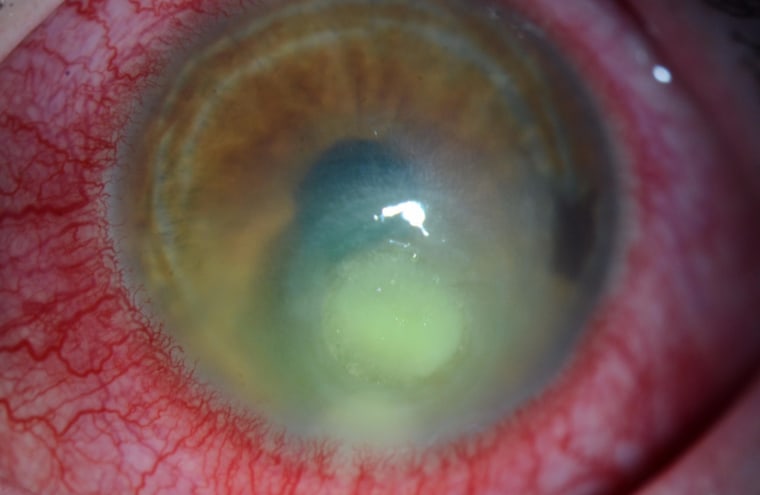For two weeks, a 57-year-old man slept in his contact lenses. He never cleaned or changed them.
What happened next? He wound up in his local emergency room, complaining of eye pain and struggling to see. Doctors noticed a deep perforation in his right cornea and instructed him to take hourly medicated drops. It wasn’t enough. He had to have a corneal implant to repair his vision.
This man's story is the stuff of nightmares for contact lens wearers. It was highlighted, along with five other stories, in an article in the Annals of Emergency Medicine. While ulcers and perforations that lead to corneal transplants are rare, developing an infection or a perforated cornea is all too common — especially when people don’t remove their contact lenses.
TODAY's Craig Melvin is guilty of this bad habit: In August, Craig wore his glasses on air for the first time in his 15-year career because he developed a corneal ulcer in his left eye — after sleeping with his contacts in.
“Each time someone sleeps in contact lenses, it can increase the risk of infection. One person had a severe infection after wearing contact lenses continuously for a two-day hunting trip,” Dr. Justin Baca, an assistant professor of emergency medicine at the University of New Mexico, and a co-author of the study, told TODAY, via email.

While most people might think sleeping in their contacts for one or two days would be safer, that man who only slept in his for two days experienced a terrible infection, including a particularly gruesome moment. After getting out of the shower, he wiped his left eye with a towel and heard a popping and felt extreme pain. He had a large perforated corneal ulcer and he needed an emergency corneal transplant.
In another case, a 34-year-old man complained of blurry vision and redness. Doctors learned that he slept in his contacts three to four times a week and swam in them. This caused him to have both bacterial and viral infections, which took about six months to fully treat.
“We do recommend you take your contact lenses out if you are going into water because water has bacteria,” Dr. Torree McGowan, an emergency medicine doctor at St. Charles Clinic in Redmond, Oregon, who was not involved in the paper, told TODAY. “Even in treated pools there is bacteria.”
The design of contact lenses makes it easier for people to develop infections. Contacts need to lay directly on the eye so people can see, but this allows bacteria and viruses to easily become trapped. When people don’t take their contacts out, the germs fester. Sleeping in contacts prevents the eye from being able heal itself.
“The tears don’t clean the eyes,” McGowan said.
Two of the six cases involved people who wore decorative contacts that they purchased from a store without a doctor’s prescription, a professional fitting or medical advice. Both slept in their contacts and developed ulcers and infections that ultimately affected their vision, even though they had not needed corrective lenses before.
That's why McGowan recommended people talk to a doctor before they even purchase over-the-counter contacts.
“They don’t have the instruction about maintenance,” she said. “Fitting is important and I am sure over-the-counter contacts do cause irritation and are less comfortable than normal contacts.”
While these case studies might cause contact wearers to panic if they even doze off in their contacts, McGowan said a few hours probably won’t cause damage. But it is important to remember to take the contacts out daily.
“One of the biggest risks is leaving those contacts in overnight,” she said. “I will see a corneal ulcer once every couple months in the emergency room and almost exclusively it is because they have slept in their contacts.”
Baca agreed.
“The health consequences from improper eye care can be serious.”
